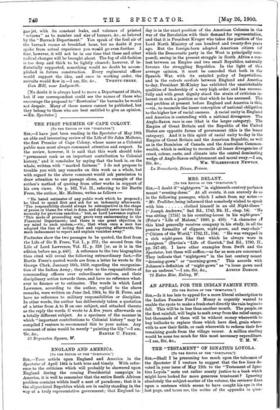THE FIRST PREMIER OF CAPE COLONY. [To THE EDITOR OF
THE "SPECTATOR."] have just been reading in the Spectator of May 19th an able and interesting review of the Life of Sir John Molten°,
the first Premier of Cape Colony, whose name as a Colonial public man must always command attention and respect. In the review, however, it is said that this work should take "permanent rank as an important contribution to Colonial history," and it concludes by saying that the book is, on the whole, written with "marked fairness." I do not propose to trouble you with any remarks on this work as a whole, but with regard to the above comment would ask permission to draw attention to one passage alone, as an example of the author's method of quoting from other works in support of his own views. On p. 162, Vol. II., referring to Sir Bartle Frere, the author, Mr. Molten°, writes as follows :—
"He hated estimates of any public work which he proposed ; he liked to spend first and ask for an indemnity afterwards. 'The responsibility should always be retrospective in the shape of praise or blame for what is done, and should never involve the necessity for previous sanction;' but, as Lord Lawrence replied : 'This mode of proceeding may prove very embarrassing to the Financial Department; and there is one great objection in my mind to such system,—viz., that when once a man has adopted the line of acting first and reporting afterwards, the main inducement to report and explain vanishes away."
Footnotes show the two passages to be quoted, the first from the Life of Sir B. Frere, Vol. I., p. 272; the second from the Life of Lord Lawrence, Vol. H., p. 318 [or, as it is in the edition before me, p. 440]. A reference to the two biographies thus cited will reveal the following extraordinary fact,—Sir Bartle Frere's quoted words are from a letter he wrote to Sir George Clerk, January 16th, 1859, regarding the reorganisa-
tion of the Indian Army ; they refer to the responsibilities of commanding officers over subordinate natives, and their
disciplinary action towards them, and have no reference what- ever to finance or to estimates. The words in which Lord Lawrence, according to the author, replied to the above remarks, were written on June 2nd, 1864, to Sir B. Frere, and
have no reference to military responsibilities or discipline. In other words, the author has deliberately taken a quotation of a letter from A to B on one subject, and attached thereto as the reply the words C wrote to A five years afterwards on
a totally different subject. As a specimen of the manner in which "important contributions to Colonial history" may be compiled I venture to recommend this to your notice. Any comment of mine would be merely "painting the lily."—I am,






































 Previous page
Previous page